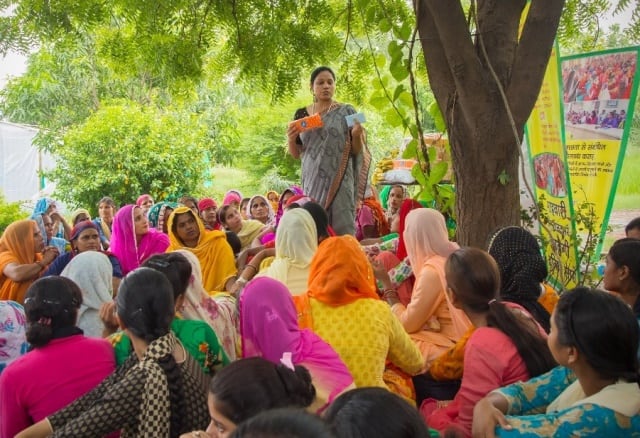
‘I Must Break Menstrual Taboo. Period’
Prachi Kaushik —a 33-year-old, Delhi-based social entrepreneur decided to break this taboo. She runs an enterprise ‘Vyomini’ which produces biodegradable and low-cost sanitary napkin, Rakshak, manufactured by marginalised women.
I grew up in a country, where sanitary napkins are still sold in black, opaque poly-bags. Talking about periods has been a taboo in our country. For an Indian woman, periods are ‘those five days’ when life suddenly comes to a halt. Naturally, working on menstrual hygiene would not be a cakewalk — I was well-aware of the enormity of the task.
Luckily, I had done my homework. Before starting on this project, I had worked with hundreds of underprivileged women educating them on the issue of menstrual health. But, taking this idea to another level by starting an enterprise single-handedly had its own risk factors and apprehensions. The words ‘period’ and ‘sanitary napkins’ were enough to make people squirm.
Besides this, convincing my family of this ‘strange’ choice of career was another task. I was 32 and unmarried. Quitting my contractual job with the Delhi government, and keeping the idea of marriage aside — to start a social enterprise — were not easy decisions. I did not belong to an affluent family and could not afford to take such risks.
Nevertheless, I was motivated. I had interacted with hundreds of poor women, who even though, understood the importance of menstrual hygiene, could not afford pack of sanitary napkins for Rs 20. Even today, women across our country of ‘jugaad’ are compelled to use harmful products as sanitary pads. They use sandbags, plastics, papers, leaves, ash and a plethora of other unthinkable things. In 2016, I started my social enterprise — Vyomini, with the help of some friends.
My team and I soon began work on the design of the napkin. We made sure that the napkin was completely bio-degradable and contained no plastic fibre. We employed women from economically weaker sections for manufacturing the napkins and giving them a final shape. After two years of rigorous work, we finally launched — Rakshak, earlier this year.
It is a low-cost, biodegradable sanitary napkin, with prices starting from Rs 5 per napkin. Eminent people have come forward to promote the cause of ending ‘period poverty’. Member of Parliament, Meenakshi Lekhi launched Rakshak; and Mrs Worldwide India 2018 — promoted Rakshak on International Menstrual Hygiene Day. We have conducted workshops across the country to educate women about the importance of menstrual health and the hazards that non-biodegradable sanitary napkins pose to the environment.
In Delhi and NCR alone, we have reached out to over 2 lakh women. After two years of launching Vyomini, sanitary napkin production plants are being run in Jhajjar and Hisar in Haryana; Sultanpur Mazra in Delhi; Bhubaneshwar in Odisa and Navi Mumbai in Maharashtra.
So far, we have sold 5 lakh units of ‘Rakshak’, produced, marketed and manufactured by more than 500 underprivileged women. The product has also reached to women in Bangladesh and Nepal. People now call me ‘Pad Woman’. People may call me a young achiever, but if we look at the larger picture, this is an achievement for the society as a whole.



